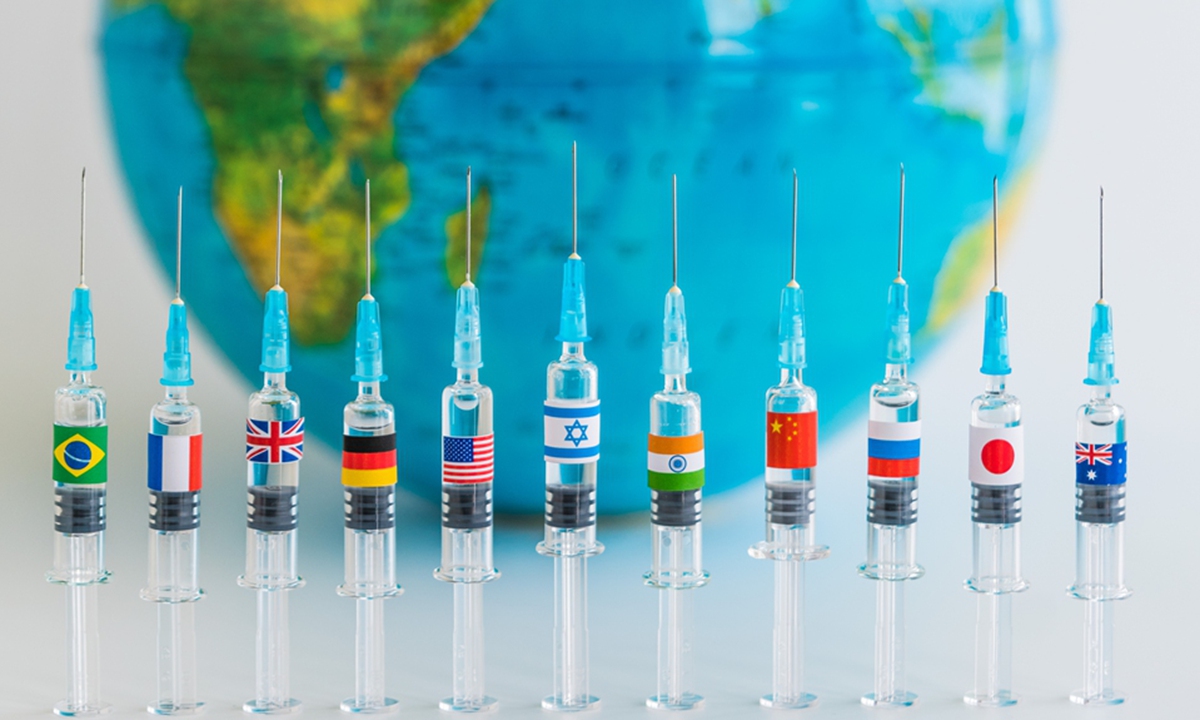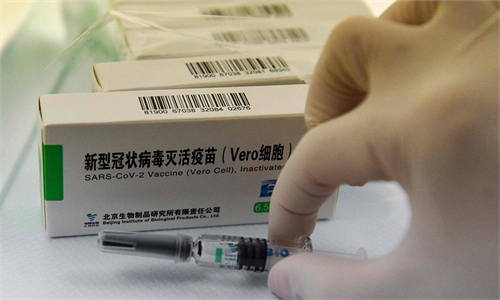US patent waiver more about saving its image

Photo: AFP
The World Health Organization (WHO) approved on Friday the emergency use of a COVID-19 vaccine produced by China's drug maker Sinopharm. It is the first vaccine against COVID-19 developed by a non-Western country that has received the WHO's endorsement and support.
Long before the approval, millions doses of Sinopharm vaccines had already be administered in China. In addition to China, the vaccine has also been approved for emergency use in countries including Indonesia, Iran and Pakistan. It is also being used in China's Macao Special Administrative Region. As the Sinopharm vaccine now is included in COVAX, many poor countries' access to COVID-19 vaccine will be specially facilitated.
China announced in February that it had officially joined the program and pledged to provide 10 million doses of vaccine to COVAX. Given China's production capacity, this number will increase as other vaccines developed by China are approved for emergency use in the future.
Currently, a major challenge in the global response to the pandemic is the insufficient production of vaccines. Besides, the lack of capacity to deliver vaccines quickly and accurately to the countries and regions that need them is another problem. Thus, the most urgent need to battle the virus is greater cooperation between major countries.
Last week, the Biden administration expressed its support for waiving intellectual property protections for COVID-19 vaccines. This is a step forward. However, it does not mean that a fast vaccine production or a fast response to the pandemic is guaranteed in every country around the world.
This decision aims to help reverse the decline of US' national image since the outbreak of the pandemic, but it cannot immediately tackle the problems of producing and distributing vaccines.
The waiver that the Biden administration refers to is not asking or forcing pharmaceutical companies to completely make their patents public or give them away. The White House means that if US companies are about to sue other countries for imitating their patents, the US government will not endorse these companies' claims at the WTO. This is to some extent positive news: If a country or a firm is capable of producing vaccines - though they are duplicated ones - just do it and the US administration will not go after you.
However, it is very difficult for the Biden administration to actually implement such a move. Countries like Germany and pharmaceutical companies including Pfizer object to this decision from the White House. They believe such practice will strangle innovations. When pharmaceutical companies lose their drive for innovation, the whole industry instead of just one or two firms will be hurt. As a response, according to a Reuters report on May 7, a German government spokesperson said in a statement, "The protection of intellectual property is a source of innovation and must remain so in the future."
Two aspects should be addressed to help deal with the challenges of the global pandemic fight. For one, in terms of production cooperation, it depends on how the WTO, the major countries, and big international pharmaceutical companies producing vaccines will negotiate and whether they can reach a consensus. Negotiations at the WTO, in particular, may take a long time for its 164 members to achieve any kind of consensus.
On the other hand, it's imperative that arrangements for the delivery of vaccines and related medical equipment as well as for the deployment of medical staff should be made as soon as possible. Efforts are needed to prevent the situation from worsening in some poor countries; or in those severely hit by the pandemic, such as India, from further going out of control.
The COVID-19 pandemic is a test to the governance capabilities of countries. Facing a public health emergency of this lethal magnitude, not all countries have the ability to deal with it. For instance, the production and delivery of oxygen cylinders are not supposed to be a difficult task. But it has become a major problem for India. Therefore, another job that the international society needs to do is help these countries improve their epidemic management and control capabilities as soon as possible.
During an interview with The Indian Express on April 30, US presidential medical adviser Anthony Fauci said India should take an "immediate" shutdown for a "few weeks" to tackle the "very difficult and desperate situation." He suggested India could learn from China's disease control practice in fighting the epidemic, such as building makeshift hospitals that could treat a large number of patients in a short period of time.
The COVID-19 outbreak will undoubtedly prompt countries to reflect on their own management systems and then make continuous adjustments and reforms to better prepare themselves for similar public health incidents in the future. The adjustments and reforms in fact have already begun, which will eventually decide the direction of global cooperation in multiple areas such as public health.
The author is a senior editor with People's Daily, and currently a senior fellow with the Chongyang Institute for Financial Studies at Renmin University of China. dinggang@globaltimes.com.cn. Follow him on Twitter @dinggangchina


